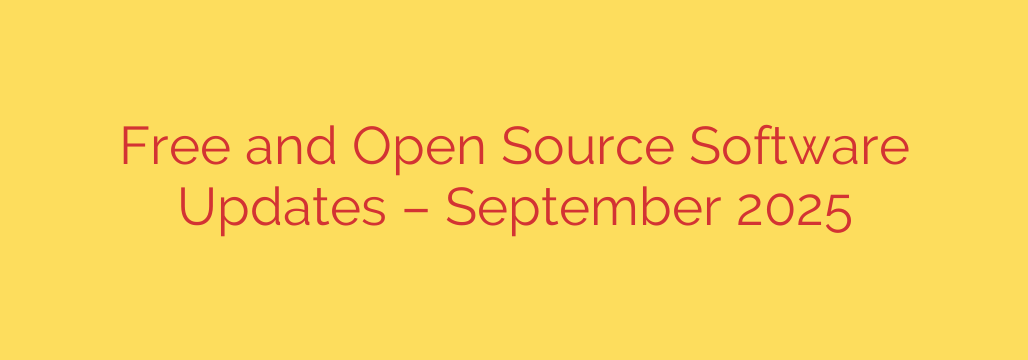
September 2025’s Essential Open Source Updates: Security, Performance, and New Features
The open-source landscape is constantly evolving, with dedicated developers around the world pushing the boundaries of what free software can do. This month has been no exception, bringing a wave of crucial updates that enhance security, boost performance, and introduce long-awaited features to some of your favorite applications. Staying current is more than just getting the latest bells and whistles; it’s a critical part of maintaining a secure and efficient digital environment.
Here’s a breakdown of the most significant open-source software updates you need to know about.
Linux Kernel 7.1: A Leap in Performance and Hardware Support
The heart of the Linux operating system gets a major upgrade with the release of Kernel 7.1. This version focuses heavily on future-proofing the platform, introducing foundational support for next-generation processors and hardware.
Key improvements include:
- Enhanced Scheduler Performance: The kernel’s process scheduler has been refined to better handle high-core-count CPUs, resulting in noticeably snappier system performance under heavy multitasking loads.
- Initial Support for Next-Gen Wi-Fi: Kernel 7.1 includes early-stage drivers for the upcoming Wi-Fi 8 standard, ensuring that Linux users will be ready for the next wave of networking hardware.
- Critical Security Hardening: Several low-level vulnerabilities related to memory management have been patched. Updating is strongly recommended to protect systems from potential exploits that could allow for privilege escalation.
GIMP 3.2: Non-Destructive Editing Arrives
For years, creative professionals have been asking for it, and the GIMP development team has delivered. Version 3.2 marks a monumental step forward for the powerful image editor by introducing a core feature: non-destructive editing.
Previously, adjustments like color correction or filter applications were permanently applied to a layer. Now, these changes are applied as adjustable effects. This means you can tweak, disable, or remove filters and color adjustments at any point in your workflow without having to undo multiple steps or start over. This single feature brings GIMP significantly closer to its commercial counterparts and solidifies its position as a professional-grade tool.
LibreOffice 8.0: Unlocking Seamless Document Compatibility
The LibreOffice suite is a cornerstone of productivity for millions, and version 8.0 tackles one of its most persistent challenges: compatibility with Microsoft Office formats. The development team has overhauled the import/export filters for DOCX, XLSX, and PPTX files.
Users will experience:
- Vastly Improved Formatting Fidelity: Complex layouts, embedded charts, and intricate tables now transfer between LibreOffice and Microsoft Office with far greater accuracy.
- Faster Loading for Large Files: Performance when opening large, complex spreadsheets and documents has been significantly optimized, reducing wait times.
- Enhanced Macro Support: While not a complete solution, compatibility with VBA macros has been improved, allowing more scripts to run without modification.
Firefox 140: A Major Push for Privacy
As online tracking becomes more aggressive, Firefox continues to champion user privacy. Version 140 introduces “Total Cookie Protection 2.0,” an advanced system that goes beyond isolating cookies. It now actively prevents cross-site tracking through more sophisticated fingerprinting methods, such as those that analyze system fonts, screen resolution, and browser extensions.
This update also fortifies the browser’s container features, making it easier to isolate your work, personal, and social media activity from each other to prevent data leakage between sites.
Your Security Checklist: Why Updating Matters
It can be tempting to ignore update notifications, but doing so leaves your system exposed. The latest software versions don’t just add features; they patch critical security holes that malicious actors actively seek to exploit.
Here are some actionable tips to stay secure:
- Prioritize Security Patches: Always apply updates that are labeled as “security” or “critical.” These often fix vulnerabilities that are already being exploited in the wild.
- Use Official Repositories: Whenever possible, install and update software through your operating system’s official package manager (like APT for Debian/Ubuntu or DNF for Fedora). This ensures the software is verified and hasn’t been tampered with.
- Backup Before Major Upgrades: Before making a significant version jump (e.g., from LibreOffice 7.x to 8.0), it’s wise to back up your important files and system settings.
- Read the Changelogs: For software critical to your work, take a moment to read the release notes. They provide valuable insight into what’s changed, including bug fixes and potential compatibility issues.
By staying informed and proactive with updates, you ensure your open-source tools remain powerful, reliable, and—most importantly—secure.
Source: https://www.linuxlinks.com/best-free-open-source-software-september-2025-updates/








